Management tip 5. The secret power
Thursday, April 29, 2010
Philosophy, human resources and balanced management are the matters which capture the most inner of my personal and proffessional heart.
Life requires from me right now to practise Real Estate Consumers Law for english speaking clients in Spain, and I adore the human, social-renovation, pro-person, avant-garde characters of the fight which you discover as you go more and more genuinely into ordinary people´s need and expectations..... but again... what I really like is philosophy.
I was reading today this article post on Legal Today by Dominguez and Guiu, I am extracting the sentences which brought food to my heart and my mind today. I do hope you will enjoy them too:
"To have internalized proffessional values and to live a proffessional life with integrity is more important that the formalism of swearing or promising them the day of the oath of allegiance".
"This is just achieved if partners ( meaning partners of a Law Firm) are humble, conscious of their obligation for improvement, have the adequate proffesionals and count with the determination and convicction to achieve the improvements "
"When a Law Firm has a solid brand id because it has been able to gain the trust of the market and attract the type of clients it once decided it wanted to attract . Brand is a proffesional life insurance"
It is true that when a proffessional has solid internal values to give expression to, the concerns about how to manage, how to delegate, how to deal with clients, how to strength the team, how to distribute benefits, how to schedule... decreases in a great sense and everything gather an inner coherency which gives an unstoppable strength to proffessional life. This is then forwarded to the life of the company.
In my opinion, this is the only real solution to company crisis and .... financial crisis too.
So the real battle needs to be in the area of proffessional values, commitment and coherence.
Anyhow, I go back to the legal matters! Hope you all have a good day!
Maria
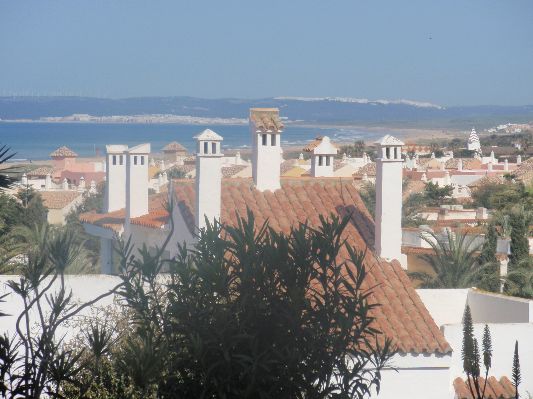
"Atlanterra and Barbate at the end and Vejer de la Frontera on the top of the mountain", by Luis Lopez-cortijo.
.jpg)
 0
Like
Published at 12:39 PM Comments (0)
0
Like
Published at 12:39 PM Comments (0)
Legal tip 267. Inheritance law applicable to your case
Wednesday, April 28, 2010
The presence of a foreign testator trying to grant a will for the sorting of his or her estate according to his personal law, it is increasingly common within Lawyers offices in Spain. At least regarding the real estate owned in this country.
In the absence of will, the heirs notarized statement regarding a foreign deceasor also has a growing importance for the current, ever growing, presence of foreign property owners in Spain, where they have, in many cases, their second home. Therefore there is a growing increase of international succession which involves the Spanish legislation.
The lex fori, which determines, by virtue of provision 9.8 of the Spanish Civil Code, the applicable law is the personal law of the deceased., that corresponding to his/her nationality. The phenomenon of inheritance or succession is always subject to the law of the nationality of the deceased, unless the rules of conflict of the personal Law of the deceased forwarded the case to be solved by the Spanish law, this is the only case where foreign forwarding rules is accepted by the Spanish rules of private international law (art. 12.2 of the Civil Code).
However, this forwarding should not be accepted in matters of succession upon death if this would lead to a "legal division of the succession" which would be this way regulated by several laws.
In the case of UK citizens and by applying:
The deceased left only property in Spain but his legal domicilie was in the UK. Spanish law applies to the entire estate of the deceased.
When the deceased had property in Spain and his legal domicile was in Spain. The Spanish court applied Spanish law the entire estate of the deceased.
When the deceased had property in UK and only personalty in Spain and his legal domicilie is in England. The Spanish court would apply English law.
When the deceased had property in England and Spain and had his last legal domicile is in England. English law would apply.
By Jesús and María L. de Castro
www.costaluzlawyers.es
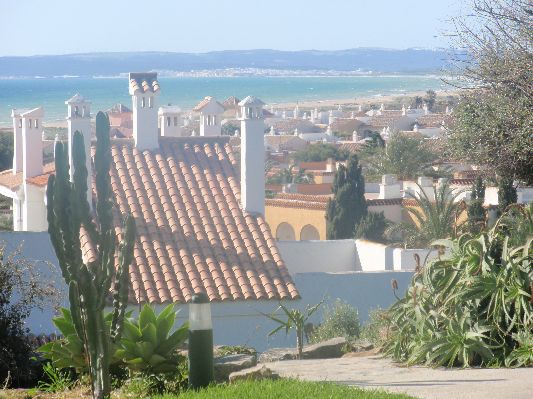
"Vista de Atlanterra y playa de Zahara de los Atunes", by Luis Lopez-Cortijo.
.jpg)
 0
Like
Published at 3:59 PM Comments (0)
0
Like
Published at 3:59 PM Comments (0)
Legal tip 266. Murcia Appeal Courts favouring Consumers
Wednesday, April 28, 2010
Murcia Appeal Court, Court decisión dated 24/09/2009, No. 202/2009, rec. 207/2009. Presenter Judge: Larrosa Amante , Miguel Angel
1) "The contract is ambiguous on behalf of the appellant who was who wrote it, so this ambiguity can not harm the consumer"
2) "It is known the Case Law which requires, for the granting of cancellation that the breach of one party frustrates the purpose of the contract for the buyer and also makes it necessary that, in order to bring an action for cancellation, that the applicant has complied with all obligations under the contract. "( Our commentary: This modern Case Law stream, does not put the criterium for the determination of the cancellatory breach on a rebellious and hindering behavior of the buyer, as it is for the old doctrines but, according to the principles of Consumer Law set the clue on the frustration of the purpose of the contract for the buyer and the fact that it has fulfilled its obligations)
3) "The failure is so obvious that it is not understood very well that the appellant insist on the lack of breach, unless it is considered that the fixing of the date of delivery is a unilateral right of the developer that buyers have to submit necessarily and without any kind of question, consideration that would not be covered by any legal regulation and which would be against provision 1256 of the Civil Code (see provision on foot page). The delivery date is an essential element of the purchase agreement and as such can not be left to the arbitrium of one of the parties. The fact that there were delays associated with building permit problems is no excuse in any way that can justify the delay, because such administrative problems are attributable only to the seller without intervention by the buyers. As a conclusion, there are grounds for cancellation, due to the breach of the completion deadline and the need of buyers for such housing earlier on time, not being, on a different sort of things, a simple delay of a few days or weeks, but a delay extended in time and that defeats the purpose of the contract."
Cheers to Mr. Larrosa Amante!
[i] Provision 1256 of Spanish Civil Code stats: " Validity and compliance of contracts can no be left to the decission of one of the contract parties"
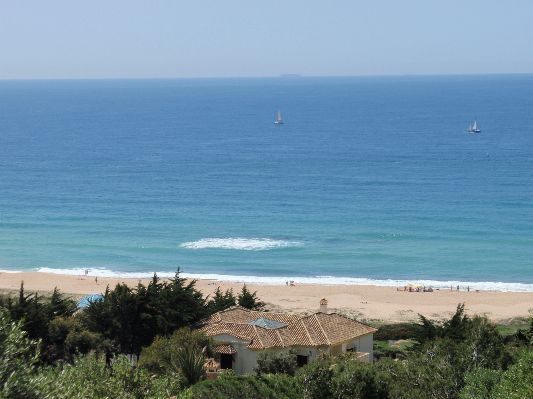
"Playa de los Alemanes", Atlanterra, Zahara de los Atunes, (Cadiz); by Luis López-Cortijo
.jpg)
 0
Like
Published at 11:12 AM Comments (3)
0
Like
Published at 11:12 AM Comments (3)
Legal tip 265. Duty of maintenance of infraestructure works
Tuesday, April 27, 2010
Urban conservation entities are public entities, of compulsory formation and own legal personality and capacity to fulfill its purpose, since its entry in the Register of Town Planning Collaborating Entities.
They arise as a consequence of the duty of maintenance of infrastructure works, including maintenance of the allocations and public services, once these have been taken over by the municipality.
This duty of maintenance can correspond to the Local Council or to the owners of plots in the execution unit sector which is subject of those works of urbanization.
When the obligation corresponds to owners, they must be grouped in Urban Maintenance Entity, and thus its affiliation is mandatory.
In Andalucia region, Article 153.3 of Law 7 / 2002, on Town Planning in Andalucia, determines that the maintenance of infrastructure works is for the owners of plots, grouped legally in Urban Maintenance Entities in the following cases:
A) When voluntarily assumed by any method.
B) When the plots are within execution units or areas identified for this purpose only, if so provided by urban planning.
Same provision states that urban conservation entities are subject to the supervision of the municipality and may request and obtain from it the application of public enforcement procedures for the requirement of appropriate conservation fees to be paid by the owners.
Quota fees of owners for the maintenance costs will be determined as follows:
A) According to what is established by the statutes of the Urban Conservation Authority.
B) Alternatively, according to what is established by the system for implementing the corresponding execution unit.
C) As a last resort, according to what is allocated under horizontal property law rules.
Owners may be individuals, companies or administrative bodies. The Local Council, as owner of some land is a landowner, and as such, has to participate proportionately in the costs.
The acquisition of ownership rights on land within the Conservation Entity determines the membership of this, involves the purchaser in the subrogation of rights and obligations attached to it, (art. 28 RD 3288/1978 25 August, Urban Management).
In this regard, Article 1.1 of Royal Decree 1093/97 of 4th of July on entries in the Land Registry of Planning acts includes, within those firm acts which are recordable in the Register, those related to maintenance or urban infraestructures.
Maria
www.costaluzlawyers.es

"Silla del papa", Bolonia, Tarifa (Cadiz); by Chodaboy, at flickr.com
.jpg)
 0
Like
Published at 9:39 AM Comments (2)
0
Like
Published at 9:39 AM Comments (2)
Legal tip 264. MIxed marriage spaniard-foreigner
Monday, April 26, 2010
Spanish and foreign citizens have the right to marry in Spain, regardless of the legal status of the foreign citizen. It is possible, therefore, to marry an ilegal foreign or a foreign on tourist visa.
The peculiarity in the case of mixed marriages (Spanish-Foreign) is the need to handle a prior procedure record before the wedding celebration. This process is mandatory and is done in the civil registry of the judicial district of residence of any of the parties and aims to determine if both bride and groom are able to marry and check on no deffects of the marriage vows.
So, once this initial procedure is concluded, the judge in charge of the Civil Regsitry will authorize the conclusion of the wedding and once the same, both will become "married under the Spanish civil law", deriving from that time a number of legal consequences of various forms, among which, with its special importance, the benefits of the legislation on immigration for the spouse of a Spanish citizen.
These preliminary procedure is mandatory and must be initiated by filing a series of documents. Each Registrar has its special way of dealing with this issue but as a general rule these documents are required:
By the foreign citizen.
1. Literal birth certificate. Legalized and translated where necessary.
2. Certificate of singleness or, in the case of being divorced, certificate of marriage recording the testimony of divorce or divorce decree. Legalized and translated where necessary.
3. Certificate issued by the Consulate of the country of origin of foreign citizens in Spain which shows the capacity to marry (some Registries do not require it).
4. Certificate issued by the Consulate of the country of origin of foreign citizens in Spain on the need for publication of banns.
5. Consular Registration Certificate issued by the Consulate of the country of origin of the foreign citizen in Spain.
6. Passport or Foreign Identification Number.
7. Certificate of registration in the local census.
By the Spanish citizen.1. Literal birth Certificate .
2. Local Census Registration certificate of the last two years .
3. Passport or National Identification Document (DNI)
4. Life and civil status certificate.
5. In case it is divorced, divorce decree or marriage certificate attested by a marginal entry of divorce.
Regarding the obtention of foreign documents, it must be taken into account:
1. Foreign documents must be properly authenticated, either through:
a) Normal legalization (seal of the issuer of the document, seal of the ministry of foreign affairs of the foreign country, seal of the Embassy of Spain in the foreign country and stamp of the Legalisation Department of the Spanish Foreign Ministry)
b) The Hague Apostille.
c) Some registries allow consular legalization (only the seal of Spain's consulate or embassy or consulate or embassy of the country of origin in Spain).
2. Foreign documents in foreign languages must be translated by an official translator. If the translation is done abroad, it must be authenticated together with the original document.
With respect to documents of the Spanish citizen, it should be noted that the certificate of Local census registration must contain the date of discharge in the register. If within the two years prior to marriage, there are several places of residence. this must be justified with the corresponding certificates of registration for each place of residence.
Once documents have been collected , the couple should contact the Civil Registry of their judicial jurisdiction and submit the file. There, the partners will fill in jury declarations and data sheet and the file will be admitted into procedure. At that time (usually) it will be assigned an appointment for the holding of a reserved hearing. It will also be assigned an appointment for witnesses to appear in order to answer some simple questions about their relationship.
The reserved hearing is one of the most important steps of the mixed marriage record as it is the principal means by which the person in charge of the Civil Registry will determine the existence of vice in the marriage agreement. The reserved hearing will take place for spouses to answer few questions to determine if they really are dating and want to marry in order to raise a family. If the purpose of marriage is not this, marriage can be declared invalid for lack of marital consent. Do not worry excessively about the reserved as bride and groom often pass it without problems.
During the proceedings, edicts will be published in case it is required. For Spanish citizens, these edicts will be posted on the notice board of justice´s Court or Civil Registry of the place or residence of the last two years (unless the town has more than 25,000 inhabitants).
Publication of Edicts for foreign citizens shall be determined by its internal rules to be certified by a certificate from the consulate in Spain.
Once the Edicts are pubished , the case will go to the Prosecutor, who will check it and will state what it is deemed as appropriate through a report. If there is no problem, this will issue an order for the approval of marriage, its notification and will set the wedding date.
Wedding can take place in a different municipality to that of the processing of the application.
Once the wedding is held, they will be given the family book and a literal certificate of marriage.
From that moment, the foreign spouse becomes an EU citizen family member and therefore entitled to residence in Spain in the Community scheme.
In order to apply for this reesidence, they will just have to go to the Immigration Office of their province and submit the following documents:
1. Application form. EX016.
2. Passport.
3. 3 photos.
4. Spanish spouse ID.
5. Marriage certificate.
6. Local Census certificate of registration of both spouses.
7. Social security card of the Spanish spouse.
In about two months, they will receive a resolution granting the residence of the EU citizen's family member. This residence has a duration of five years and allows the performance of work activity as either self-employed or employed person.
By Jesus and Maria L de Castro

Playa de Bolonia, Cadiz; by Chodaboy, at flickr.com
.jpg)
www.costaluzlawyers.es
 0
Like
Published at 2:30 PM Comments (16)
0
Like
Published at 2:30 PM Comments (16)
Legal tip 263. New Won Cases
Friday, April 23, 2010
New Won Cases section of our website has been updated today! Please click here
Cheers!
Have a great weekend!
Maria

"Mirando atras", playa de Los Lances, Tarifa (Cadiz); by Chodaboy, at flickr.com
.jpg)
 0
Like
Published at 5:17 PM Comments (1)
0
Like
Published at 5:17 PM Comments (1)
Legal tip 262. Polaris world selling 100 million euros assets to Banks
Friday, April 23, 2010
Polaris World’s has been able to refinance its debt by selling some of their assets to its most important creditor banks . By means of this actions Polaris has waived going into administration (Creditors Meeting).
Polaris has refinanced a debt for 100 million Euros owed to 15 major high street banks. The agreement implies the selling to these banks of a good number of its assets.
As a purchaser of Polaris World off plan developments you still have and keep your rights over the property or properties that you are purchasing or have paid deposits for this purpose; regardless of who the proprietor is.
Nevertheless, under these new circumstances and by means of the above refinancing agreement, Polaris has been able to receive cash that will allow it to comply and fulfill their liabilities. Among the liabilities they should now face, are those for which we are representing you: Cancellation of your Purchase Contract due to delay and lack of advertised facilities and full refund of your deposits and interests. If your case is currently following a legal proceeding in the Courts, and if your case is won as we are confident and expect to, these liabilities will also include the full coverage of your legal costs.
Polaris will concentrate now more on real estate management, touristic and sport services aand on the manufacturing and sale of furniture. A very good and wise option in my opinion. Congratulations to Polaris World!
By Maria L. de Castro
www.costaluzlawyers.es
 0
Like
Published at 2:19 PM Comments (3)
0
Like
Published at 2:19 PM Comments (3)
Management tip 4. Saving Spanish Tourism before it´s too late
Friday, April 23, 2010
I received this article yesterday by IESE Insight and wanted to share it with you.
 Saving Spanish Tourism Before It’s Too Late Saving Spanish Tourism Before It’s Too Late
Argandoña Rámiz, Antonio
Original document: Corporate Social Responsibility in the Tourism Industry. Some Lessons from the Spanish Experience
Year: 2010
Language: English
The tourism industry in Spain continues to run on the momentum of previous decades of high growth. But the dip in tourism revenues in 2009 may be the signal that the model that has served the industry in the past will not hold for the future. Decades of unchecked overdevelopment have led to environmental and aesthetic degradation, along with social costs for local communities. Considered alongside inherent policy problems, Spain’s tourism industry may be headed for a long downward slide.
In “Corporate Social Responsibility in the Tourism Industry: Some Lessons from the Spanish Experience,” IESE Prof. Antonio Argandoña states the case for the potential of CSR to create a more sustainable future for the industry.
The original model was based on three premises:
- large European market;
- high potential to attract international tourism based on the three S’s of sun, sand and sea;
- accessibility through an abundant supply of low-cost accommodation and good infrastructure.
These, in turn, guided all subsequent policies and incentives to make mass tourism possible. The government offered subsidies for foreign promotion and stimulated the private sector through tax benefits and cheap loans for the construction of tourist accommodation and infrastructure. Thus, Spain’s image was transformed from a European backwater to a cheerful holiday destination.
Eyesores in Benidorm
Few can deny that Spain has benefited from tourism. Despite increased competition and even taking into account the 2009 slump, Spain remains a strong contender as a leading holiday destination.
But as much as the model has yielded positive results, the very advantages that transformed Spain into a tourist mecca have at the same time become a curse.
- Visitors remain highly concentrated from one region (93.5 percent from Europe in 2008).
- The sun, sand and sea formula means that tourism is dependent on the summer season.
- Infrastructure is based along the coasts.
This shortsighted policy means that, ironically, eventually no one may be able to enjoy holidays in Spain in the long run, if the industry sticks to its current path. An overabundance of high-rises has led to overcrowding on the beaches and, in turn, to the degradation of natural resources and diminishing quality of life for visitors and residents alike.
But what can de done? Unfortunately, the industry’s future is shackled with the past model.
- Unaccommodating physical capital. Little else can be done with high-rise developments once they are built.
- Lack of incentives to change. The economic benefits of mass tourism fill government coffers and secure the votes of constituents who all want a piece of the pie.
- Polarized discourse. The financial interests of real-estate developers, not to mention the families whose livelihoods depend on tourism, are pitted against the interests of environmental advocates.
These are significant burdens that make moving forward more difficult. All the actors that make up Spanish tourism – tourist companies, local and regional governments, communities – are held hostage to these factors.
Charting a New Course
The author argues that CSR – that is, a company understanding its social role and the wider consequences of its actions – can slowly bring new direction to the industry.
If each and every company made a conscious effort to live up to its social responsibilities, this could yield important results. Granted, their impact would be proportional to the size and constraints of each enterprise and operator. But even if the company is just one link in the chain, this serves an important role in building a sense of collective responsibility.
It starts with personal responsibility – for the owner, manager or employee – and spreads upward to the whole company, a sector and eventually the entire industry.
On a company level, the author recommends instilling a culture of responsibility through training, collaborating with stakeholders and setting a long-term vision.
The author acknowledges that there may be instances in which the forces holding companies hostage to the old model may be stronger than their attempts to act responsibly. In these situations, the collective action of the industry is required.
On the industry level, CSR can bridge the gap between the government’s policy attempts – until now more reactive than proactive – and bring about more resolute responses to the exhaustion of the Spanish model. The key to transformation is stakeholder dialogue that takes into account the wider economic landscape, and a clear demonstration of leadership.
If Spain does not take a step back and evaluate the course it has been on, then its tourism industry runs the very real risk of playing out the so-called “tragedy of the commons” – a perverse phenomenon in which multiple actors, each pursuing his own self-interest, eventually deplete a shared resource, even when it clearly goes against everyone’s long-term interests to do so.
CSR points a brighter way forward for the long-term sustainability of Spain’s environment and heritage, and with it, Spain’s continued status as a vacation paradise.
.jpg)
Camping "Torre La Peña 1", Tarifa (Cadiz), by Chodaboy, at flickr.com
.jpg)
 0
Like
Published at 11:07 AM Comments (2)
0
Like
Published at 11:07 AM Comments (2)
Management tip 3. Rebuilding trust toward finantial operators
Friday, April 23, 2010
This report was sent to me yesterday by IESE Insight. I wanted to share it with you.
Road to Recovery Requires Rebuilding Trust
Vives Torrents, Xavier; European Economics Advisory Group (EEAG)

Publisher: CESifo
Original document: The EEAG Report on the European Economy 2010
Year: 2010
Language: English
While acknowledging signs of recovery after the intense economic recession of 2008-2009, the 2010 report of the European Economic Advisory Group (EEAG) warns that we are not out of the woods yet. Several factors may damper any recovery, and the report outlines major challenges still to come.
The authors, including IESE’s Prof. Xavier Vives, suggest that the restructuring process of the banking system, for example, is far from over. This may result in credit constraints and a reluctance to extend loans. Other hurdles include a slack in capital utilization, and a tense and possibly deteriorating labor market, which could lead to a decrease in private consumption.
But all is not lost. The authors predict that emerging economies should see more favorable economic conditions, becoming the growth engines of the global economy. And GDP, though remaining subpar, will go up by 2.3 in 2010, they say.
Macroeconomic Conditions
In the United States, the recession has, according to the report, officially come to an end. The strongest negative growth contribution in 2009 came from investment, and there was a sharp fall in demand for foreign goods. However, the decline in exports was less obvious, enabling the trade balance to improve significantly. Furthermore, in mid-2009, real-estate prices ended their freefall. The authors attribute this to the enormous subsidies and tax reliefs granted by the U.S. government.
In Europe, all member countries, with the exception of Poland, suffered the effects of a deep recession. Recovery in Europe began in the second half of 2009, with the exception of Cyprus, Greece, Spain and the United Kingdom, which were still in recession in the third quarter of 2009. Although the prospects of firms have improved, problems with the banking sector remain, which may hinder a strong recovery in investment.
Japan, the hardest-hit major world economy, began its recovery in the second quarter of 2009, with the most important drivers – foreign trade and private consumption – leading the way. However, the annual growth rate for 2009 still fell, and long-term prospects are bleak.
In China, meanwhile, things are looking up. The country has been able to recover to pre-crisis growth levels, and short-term economic prospects remain positive.
Rebuilding Trust
While some policies have been successful in preventing another Great Depression, recovery remains fragile. One reason for this, according to the authors, is the collapse of trust toward financial intermediaries, bankers and financial markets. The report takes a look at the adverse effects the crisis has had on trust in financial markets, and analyzes whether the financial sector will be able to resume its activity at the pre-crisis level.
The fall in trust, largely provoked by opportunistic behavior, will most likely result in a drop in investment in risky assets and in the demand for complex financial instruments with ambiguous returns, less diversified portfolios and less reliance on intermediaries. In their chapter on building trust, the authors outline two avenues: enhanced regulation and industry reaction.
The authors argue that financial regulation may affect the perceived solvency of the intermediaries, but is likely to have little impact on trust. The most relevant proposal to recover trust, according to the report, is the creation of a consumer protection agency proposed by the Obama Administration, and the creation in the United States of a Financial Fraud Enforcement Task Force.
The alternative strategy relies on the intermediaries themselves to rebuild their reputation. The authors suggest some possible ways to do this.
Implement a rating system for intermediaries. An easily understandable rating system, from zero to 10, would grade intermediaries on their ability to offer trustworthy services, reducing the scope for opportunistic behavior and giving intermediaries incentives to increase their trustworthiness.
Create a trust-based compensation scheme. Providing incentives by compensating the investor’s manager would promote trustworthy behavior and increase investor trust and their willingness to invest.
Promote financial education. Taking action to educate investors, whether through financial education in public schools or third-party educational materials, would help investors avoid falling victim to financial abuses.
The 2010 report also includes a chapter analyzing the large deficits of major developed countries, as well as an analysis of the impact of the crisis on the U.S. economy and the euro zone, using Greece as a case in point.
In our country, I think that trust rebuilding by Banks and Savings Bank will require a firm behaviour by them for the honouring of Bank Guarantees of Law 57/68 and the commitment to meet the risponsability stablished in provision 1.2 of Law 57/68 if Guarantees were not in place.
 0
Like
Published at 10:58 AM Comments (2)
0
Like
Published at 10:58 AM Comments (2)
Legal tip 261. No win no fee and specialization
Thursday, April 22, 2010
This issue has been treated before in this blog and I have my particualr opinion that a full no win-no fee is impossible and even unfair towards the lawyer who needs to bear with work and study efforts, staff expenses, office maintenance...
But let me show you again today the " status quo" on the legal character of the "no win-no fee" agreement for Spanish Lawyers.
In 2002 the Court for Fair Competition (TDC) sanctioned with a fine of 180,000 euros to the Spanish Law Society and ordered to amend the prohibition established in its Code of Ethics for lawyers for these professionals to “freely” establish with their customers the prices for their services. The TDC was thus giving the reason to the lawyer José Luis Mazon, who considered that the ban on so-called "contingency fees" or “no win, no fee” was against free competition. Mazon had filed a complaint against the Law Society for a conduct "allegedly prohibited" by the Law on Competition.
The Supreme Court, in November 2008, stated that the prohibition of the “no win, no fee” " is diametrically opposed to the provisions of Article 1.1.a) of the Law on Competition which prohibits direct or indirect fixing of prices as well as other commercial or service conditions." So the Supreme Court declared in 2008 that the no win-no fee agreement is legal for lawyers in Spain.
For those cases of our specialisation, where study for one benefits all the other cases ( Real Estate Consumers Law), we can offer our clients what we consider fair to the two parties: lawyer and client: a partial no win-no fee agreement. This way we charge an intial provision of funds and nothing else is charged to the client till the result is achieved.
I do think that (1) the possibility of legal online services, which is being consolidated by both the coming new rules for lawyers in Spain by the Law Society, and (2) the fact that we can work nationwide, is driving the proffesion to definite specialisation.
And I do think that specialisation is good for the development and accuracy of the legal system. We lawyers are legal solutions providers.
Also.. specialisation and nationwide pratises open the possibilities for more reasonable feeing. That´s is exactly why we can offer the partial no win, no fee.
Anyways... it is a very much a controversial matter.
Best regards,
Maria
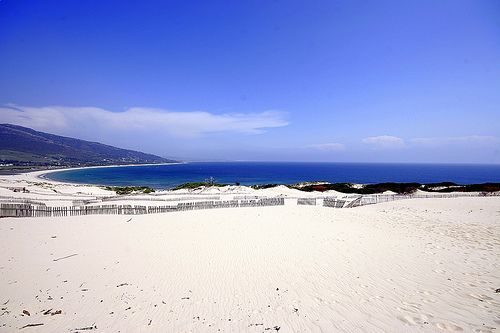
"Duna", Beach of Valdevaqueros - Tarifa (Cadiz); by Chodaboy, at flickr.com
.jpg)
 0
Like
Published at 5:46 PM Comments (7)
0
Like
Published at 5:46 PM Comments (7)
Legal tip 260. Insolvency and Bank Guarantees
Wednesday, April 21, 2010
My best legal tip of today, out of 103 emails being answered since 8:00 am:
Developer under insolvency proceedings:
a) You have a Bank Guarantee: go and execute it if completion/starting deadline has not been met by developer
b) You do not have a Bank Guarantee: Start action 1.2 of Law 57/68

Playas de Tarifa (Cáby Chodaboy, at flickr.com
.jpg)
 0
Like
Published at 6:40 PM Comments (3)
0
Like
Published at 6:40 PM Comments (3)
Business tip 13. Adapting a Spanish village for English-language teaching.
Wednesday, April 21, 2010
Specifically tailored for executives who have little time available to dedicate to areas such as grammar and actual practice of the language, the course has been designed to encourage people to overcome their fear of speaking in English and to enable them to be capable of following a conversation on any topic, to understand a telephone conversation in any kind of accent and, most importantly, to understand and recognize the differences that exist between set phrases, in English and Spanish.
For all intents and purposes, it is still a language academy, a training centre.
There are some abandoned towns in Spain ready to be bought. For more information on these, please click here.
Of course what it is actually bought are the different properties ( rustic and urban) located within the town. Then someone or a legal entity ( fundation, association, company, community of owners) will be required for the commun maintenance and exploitation of the village if this is used as a learning space. This entity or person would be the owner of the business.
The owner of the business must have a varied and qualified staff, teachers specialized in English language, graduates in English and native speakers for the various tasks and activities which take place in the village.
The setting up of the centre and its development is subject to authorization from the authorities and the granting of environmental licenses.
The village (business), as well as offering all the services of a communal village, must offer an information and orientation service for the students so that they are aware of the course details and who are there to solve any problems or answer any queries that the students may have.
As general features, it must have a company name and an individual or company responsible for the facilities. An SL would initially suffice. For information o how to form an Sl, please click on here.
It will also have the necessary procedures in place for dealing with enquiries and complaints. It will detail all the courses on offer in its facilities, the rules and regulations, provide tutor lists as well as the contractual conditions of the products offered.
In accordance with Spanish law, the company will do a strict risk prevention assessment. “Prevention, meaning all the methods adopted or put in place in all areas of the business in order to avoid or reduce work-related risks”.
The adaptation, design, building characteristics of the areas of work and teaching areas should provide total safety from all type of eventuality.
In short, to launch a business for teaching English , immersed in context and with the particular characteristics of a small Spanish village, the village must be adapted just as we would adapt a building or premises, with its particular characteristics and within the geographic and architectural dimension of the chosen village.
By Jesus Castro and María L. de Castro
www.costaluzlawyers.es
.jpg)
Vistas restaurante El Tesoro, Tarifa (Cadiz);by Chodaboy, at flickr.com
.jpg)
 0
Like
Published at 12:48 PM Comments (0)
0
Like
Published at 12:48 PM Comments (0)
Legal tip 259. Where Costaluz is now
Tuesday, April 20, 2010
While others are now announcing themselves as specialists on contract cancellation and battles against developers and banks in Spain, we have been doing it for more than four years ( since March 2006), even before the credit crunch started. As a result,we have now a broad variety of different legal actions to protect the most un-protected ones against developers and Banks.
While others are reducing their conveyancing departments and forwarding staff to litigation services now, we have a consolidated litigation team and are currently making improvements in our resources so we can offer to you a personalised, fun, efficient and modern Conveyancing and Company Formation service. We are able to be there, at the next step: that is a sign of company´s health.
What a bunch of extraordinary proffessional people I am lucky to have around! Thanks team! They are by nature upstream swimmers ... cannot help it! They are before the times. I am so proud to have them with me.
Thanks to you all!
Maria
.jpg)
Playa de Los Lances, Tarifa (Cadiz); by Chodaboy, at flickr.com
.jpg)
 0
Like
Published at 2:49 PM Comments (6)
0
Like
Published at 2:49 PM Comments (6)
Legal tip 258. Law + Network for Spanish Courts
Tuesday, April 20, 2010
The Ministries of Justice and Industry will develop Ius + Red ( Law+Network) Program
The program will lay the foundations for technological development under the Strategic Plan for the Modernization of Justice 2009-2012.
This agreement provides for the possibility that the regions with authority for Justice can subscribe cooperation agreements to co-finance activities in the procedural field and regarding interoperability and distribution.
Also, the National Government will fund the actions arising from this agreement to be implemented in those regions without authority in Justice.
In addition, it seeks to join forces and move forward on a consensual basis and throughout the whole country, towards a model of agile and technologically advanced judicial administration which will provide further and more effective services to the citizenship.
I do bet for a technologically advanced Justice in my country, I am sure we will very soon be there. Your claims on this have been necessary and are necesary... keep them coming.
(Diario Juridico, 20/04/2010)
.jpg)
Isla de Tarifa (Cadiz) y gruas del Puerto de Tanger (Marrocco) al fondo; by Chodaboy, at fickr.com
.jpg)
 0
Like
Published at 1:47 PM Comments (0)
0
Like
Published at 1:47 PM Comments (0)
Legal tip 257. New regulations for lawyers in Spain
Monday, April 19, 2010
The Law society seems to be at its most intense discussion of recent years. Take the opportunity to send suggestions and claims: I am sure they have heard all we have sent before specially regarding lawyers independency and conflicts of interests.
One of the most interesting discussions seems to be on online legal services, which are being considered "a form of exercise of the profession". This formula raises fears for his connection with the intermediary companies providing legal services. Let´s see what the final proposal is about.
The text also includes the "principle of free advertising" with the specification that this publicity can mention clients of lawyers with the authorization of those.
On the chapter of rules for the hiring of legal services, the text includes letter of engagements and invoices to be mandatory. The goal is to achieve more transparency. The text is somehow like this: 'Before legal performance, the lawyer shall provide to the customer an order sheet setting out the services entrusted to the Law Firm, the budget and the schedule of payments. Provintial Bar Associations will provide models of letters of engagement.
In regard to the invoices, it is said flatly: "Lawyers must deliver invoices to customers”
Regarding conflicts of interest, it includes a section, also much discussed, which provides support for the approach facilitated by the so-called Chinese wall: "The lawyer will not advise, defend or act on behalf of two or more clients in a same matter if there is conflict or significant risk of conflict between the interests of those customers, except if expressly authorized in writing by both parties, who will be previously informed of this fact. "
A suggestion: I would certainly change the adjective "significant" for "the slightest" and would add a rule for the judgement on conflict of interest to be submitted and decided by a third impartial person, a member of the Bar Association.
Among the penalties for professional societies, closure is not included, just monetary fines.
Another suggestion: I would certainly think about including some closure, at least temporary.
Las Dunas, con Tarifa (Cadiz) y Tanger (Marruecos) al fondo; by Chodaboy, at flickr.com
 0
Like
Published at 2:11 PM Comments (0)
0
Like
Published at 2:11 PM Comments (0)
Legal tip 256. Precedent favouring buyers without Bank Guarantee when Insolvency Proceedings
Friday, April 16, 2010
Buyers of Martinsa-Fadesa who have not received their houses due to delays and failures of the construction will have priority over other creditors in the recovery of amounts paid in advanced in off-plan purchases. This will be effective even if the amounts are not backed by Bank Guarantee or Insurance Policies. Martinsa entered into creditor´s meeting in July 2008.
This follows a ruling by the Commercial Court No. 1 of La Coruña, which requests the receivers to exclude a home buyer from the list of creditors of the insolvency proceedings (which are the ones who suffer the consequences of insolvency protection and are subject to composition with creditors).
Thus, the savings invested may be recovered against the assets of the company if the purchase contract is cancelled due to default of the developer, since only this way, this payment can be considered as credits against Martinsa-Fadesa.
The claims against the assets are the first ones to be paid in a payment plan or in a liquidation process, ahead of privileged claims (such as those holding by the Treasure Department and Social Security) and the ordinary, where generally are included the most of the creditors.
By Maria L. de Castro
www.costaluzlawyers.es

Playa de Bolonia ( Cadiz) by Campanilla at Flickr.com
.jpg)
 0
Like
Published at 12:40 PM Comments (20)
0
Like
Published at 12:40 PM Comments (20)
Business tip 12. Tourism and Housing in Spain 2010. Part I
Thursday, April 15, 2010
The number of foreigners with a valid residency permit or registered in Spain at the end of the third quarter of 2009 rose to 4,715,757 people - an increase of 10% on the previous year.
According to the World Tourism Organization, Spain is second, after France, in the list of countries receiving the highest volume of foreign tourists, and receives 7% of world tourism, placing it ahead of the United States and Italy.
In the last quarter of 2009, foreign residents in Spain bought 7,340 residential properties, 21% more than in the previous quarter and 11.8% more than in the same quarter of the previous year, according to figures from the Ministry of Housing.
Property sales have finally increased once again after eleven consecutive quarters of decline. Between October and December of 2009, there was an increase of 4.1% in this key statistic which meant the first year-on-year rise since the end of 2006.
The rise of almost 20% in property sales in February, 2010, as a yearly rate since 2008, has raised hopes in the housing sector. The majority of experts consulted confirm that these positive figures are a reflection of the drop in prices, low rates of interest, the expectant hike in VAT and the end of tax relief. Although some of these strengthening factors cannot last in the long term, they will be replaced by other equally effective factors.
These experts affirm that the housing market will pick up soon, much quicker than expected, in line with the increase experienced in the second quarter of 2010 and in a much more discernable way during the remainder of the year. However, it will not show a total recovery as the main problem in the sector is the illiquidity of the amount of building plots, although there are now financers who are prepared to begin new projects and, above all, to once again finance responsible building developers.
In the days leading up to Easter, estate agents specializing in second homes claim an increase of 50% in requests from the British interested in their real estate offers, in particular along the Costa del Sol and in the Balearics.
In-bound tourists in Spain, 2009, by nationality:
TOTAL
Total 52.231.098
Germany 8.925.909
Austria 493.832
Belgium 1.596.899
Denmark 958.909
Finland 517.505
France 7.916.165
Ireland 1.458.149
Italy 3.181.561
Norway 887.224
Netherlands 2.094.632
Portugal 2.051.987
Great Britain 13.324.625
Russia 421.161
Sweden 975.775
Switzerland 1.141.224
Other Europe 1.800.280
USA 1.137.655
Argentina 295.538
Brasil 248.414
Canada 182.177
Chile 38.695
Mexico 238.235
Venezuela 39.160
Other American 498.900
Japan 228.572
Rest of the World 1.166.288
Source: IET www.iet-tourspain.es
In-bound tourists in 2009 classified by type of accommodation used:
TOTAL 52.231.098
Hotel & similar 31.968.791
Free accommodation (own,
Family etc) 12.166.803
Rented accommodation 4.666.959
Other 3.001.870
None specified 426.672
Source: IET – www.iet-tourspain.es
Written by Jesús Castro
Translated by Rachael Harrison
Duna y Valdevaquero, Tarifa (Cadiz), by Chodaboy; at flickr.com
 0
Like
Published at 11:49 AM Comments (0)
0
Like
Published at 11:49 AM Comments (0)
Legal tip 255. The Omnibus Act and business licenses in Spain
Wednesday, April 14, 2010
One of the main hurdles for any self-employed person or business wishing to set up or expand their business premises in Spain is the excessive length of time taken to be granted a business license. The business license for a commercial property is an administrative permission granted at local level (local council) which allows trading to commence.
Everything now stems from the publication of Act 17/2009, of the 23rd November, regarding free access to service activities and the practice of this Act which has been partially incorporated into Spanish Law, Directive 2006/123/CE, dated 17th December, 2009.
The so-called “Omnibus Act” will radically change the service sector, adapting it to European standards. However, it is inevitable that there will be problems in Spain in implementing a system whose jurisdiction is the responsibility of the autonomous regions and the city councils. From now onwards, all that will be necessary will be prior notice or a sworn statement from the interested party issued at the start of commercial or industrial activity. This Act is specific to comercial and industrial activity and excludes, for example, professional services and catering. Furthermore, the list of exclusions includes non-economic services of public interest, such as defined in each country, for example services related to taxes, audio-visuals, notaries, security, charities, temporary employment agencies, health and gambling.
Similarly, its scope is also limited concerning the so-called economic services of public interest: postal services, electricity and gas supply, distribution and supply of water, and refuse management.
From now on, the replacing of authorisations with prior notices or sworn statements is how we shall proceed. A sworn statement will be a document signed by the interested party, in which he states, under his full liability (stating expressly, in a clear and precise manner in the sworn statement) that he meets all the necessary requirements as per the current law, to be granted the recognition of a right, an entitlement or the exercise thereof, that he posesses the relevant authorisation documentation and that he affirms to maintain his commitment for the period of time implied by said recognition or entitlement.
Article 5 of the “Omnibus Act” is ilustrative of and sums up the forementioned:
“Under no circumstances will access to a service activity or the exercise of said activity be dependant on an authorisation system, when notice or a sworn statement from the provider in which he/she demonstrates the necessary requirements and provides the necessary information to the relevant authority will be considered sufficient”.
By Jesus and Maria L. de Castro
www.costaluzlawyers.es
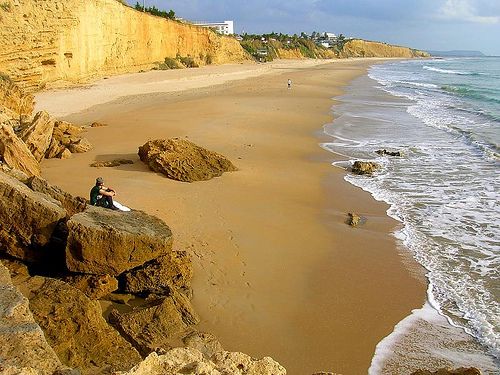 .jpg)
Conil de la Frontera ( Cadiz) beach by Shehani at Flickr.com
.jpg)
 0
Like
Published at 2:48 PM Comments (0)
0
Like
Published at 2:48 PM Comments (0)
Maria, London and Andalusian quality services
Tuesday, April 13, 2010
I visited London with my family and one of my five brothers´ family this last weekend. It was a verry sunny, blue and pleasant weekend and we enjoyed a lot the city, its people and .... the services.
The quality of services in London always appealed to me. I always return with the strong determination for committing myself to bring Andalusian services to higher levels: we have great weather, thousands-year-old historical and cultural treasures, refreshing beaches, rich literature, delicious gastronomy, consolidated democracy, pleasing golf-courses, hospitable people and.... we are still not ready to offer to our visitors the very best of the services. We still do not have the strong entrepreneurial culture that Andalucia requires.
We cannot longer feel satisfied with offering just smiles, good paella and sangría and mañana-mañana. These do not work anymore. It is very good that Consumer Law is getting stronger and stronger for companies also to revise their policies and attitudes.
It is necessary to make the future generations ( beggining with ours) aware that we need to be able to offer our visitors the best of our homeland for work rates to improve and for the economy to flourish and we need to do it in the best of the profffessional ways.
We can: of course we can.
Maria
www.costaluzlawyers.es

Tarifa ( Cadiz) beach by Chodaboy at Flickr.com
(45).jpg)
 0
Like
Published at 4:42 PM Comments (2)
0
Like
Published at 4:42 PM Comments (2)
Legal tip 253. A full package of legal advise on renting
Monday, April 5, 2010
An EOS member "woke me up" this morning with this full list of interesting questions on rentals. I have also attached a link to articles on this topic published in the articles section of EOS.
As always, my answers in bold green. Green is the color for hope in Spain. Is it the same in the UK? Ireland?
My most and first advise is to submitt the contract to arbitration rather than Courts.
Please have answers to your questions below in bold green ( same text as your email):
1. What references should I obtain and are guarantees possible in Spain? The best guarantee is to submitt the contract to arbitration rather than Courts. References can be provided by the prospective tenant but there is nothing like a public office to provide them.
2. Can credit checks be performed in Spain and if so how? RAI is a defaulters registry in Spain. What is the minimum personal information I can request from a tenant? As much as he allows you to.
3. Can I hold the security deposit in my own bank account or must it be deposited elsewhere? Yes, you can hold it in your own bank.
4. How long do I have to carry out any repairs to the property and can the tenant withold the rent until the repairs are done? There is no legal timeframe for the repairs being done. It will depend on the type of reparations needed on every occassion. The tenant can terminate the contract if repairs are not made, so any rents allegedly unpaid due to necessary repairs will be difficult to claim back.
5. Is there a maximum period for a long term let on a temporary contract? No, there is not.
6. If I am unfortunate to have problematic tenants how do I go about evicting them? Through the eviction procedure, whish is long and costful. That is why we always advise people to submitt the contract to arbitration ( quicker, and cheaper way to solve this type of conflicts)
7. Is there a time period for me to return a security deposit at the end of a tenancy and is there a procedure for deductions e.g do both parties need to agree on deductions being made? what if both parties do not agree? You have one month after which, legal interests will have to be added to the refund. Yes, both parties need to agree on deductions being made. If there is a disagreement you can go to the Consumers office ( if the landlord was a company). Again, the arbittration system covers these circumnstances much better than the judicial system would do.
8. I have heard that changing bills into tenants names can be difficult, time consuming and sometimes costs. What is the best procedure with regards to bills - should I pay them and get reimbursed or should I take the effort to change the holder? This depends on personal preferences.
9. Finally the contract - does this have to be in Spanish? Ideally I would like it in Spanish with an english translation. Does anyone know where I could get hold of such a contract? Any lawyer with rentals services should be able to provide this to you. I have also heard that the contract should be submitted to arbitration- it is highly advisable does anyone know how this is done? Does there have to be a specific clause in the rental contract? Yes, adding an specific clause to the contract in this sense, is the way to do it. You will also be choosing the arbitrator in that clause
(43).jpg)

Santuario de la Luz ( Tarifa, Cadiz) by Basilievich at Flickr.com
 0
Like
Published at 9:14 AM Comments (0)
0
Like
Published at 9:14 AM Comments (0)
Legal tip 252. Now the music is over...
Sunday, April 4, 2010
As my friend, workmate and colleague Fernando Alberich said to a lawyer-representative of a big development company in Murcia region last Wednesday, during a meeting we held together in order to see if there was a way to solve problems: " We all danced when there was music playing"; we were obviously talking on how the finantial crunch has put an end to many dreams and.... abuses.
Today I have read in the Economnist that the spokeman of the main developers´association blame the financial system of unfair competition, as Banks are now selling properties at conditions which are unachievable for developers.
Yes, Banks are approaching persons´ pockets, as at the end of the day, consumers, persons... final addressees of economy mark the rythm. So natural as life, indeed.
From a consumers legal perspective, there are also many other ways for calling the bahaviour of the most of the financial entities during the real estate Spanish boom related to the securing of Bank Guarantees out of provision 1.2 of Law 57/68: negligency, unfaithfulness, conflict of interests, omission of guaranteeing duties...
Anyhow, we are starting the final stretch of the current 2009-2010 course... ready to start the big battle for consumers rights against financial institutions in the field of off-plan developments. Any taker for the fight, please contact us. ;)
Have a great Sunday!
Maria
www.costaluzlawyers.es
(150).jpg)
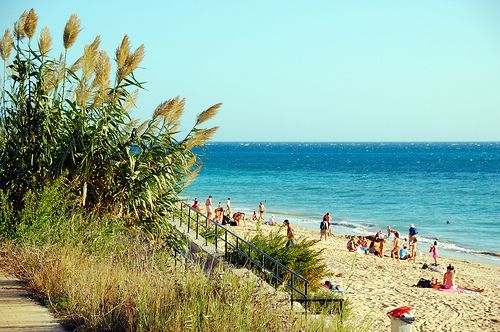
Zahora beach ( Cadiz) by Basilievich at Flickr.com
 0
Like
Published at 2:53 PM Comments (0)
0
Like
Published at 2:53 PM Comments (0)
Legal tip 251. So: let´s claim to the Banks.
Thursday, April 1, 2010
According to a new published in "La Vanguardia" yesterday:
"The main Spanish banks are resisting a difficult environment. The defaults have shown signs of stabilization, but will remain at a relatively high level in 2010, and is expected to push the benefits, "according to a report by rating credit risk agency Fitch.
'The collapse of the housing sector and the recession in Spain have affected financial institutions', but Fitch is not' worried 'about the situation of the big banks, through “their current income, asset management, strong capitalization and continued access to financial markets” . The director of financial institutions at Fitch, M. Maria Jose Lockerbie, remember that institutions face the deterioration of the quality of its assets since June 2008, although 'in late 2009 some signs of stabilization appeared. " The credit rating agency - that with Standard & Poor's and Moody's had an essential role in the dissemination of financial assets contaminated by subprime mortgages between 2003 and 2007, underlines that the main institutions recorded a strong operating profit during years of great recession.
The report also notes that the benefits of the two large Banks, Santander and BBVA have outpaced those of their international competitors due to its large network of branches and their geographical diversification. For its part, Caja Madrid and to a lesser extent, La Caixa, more rooted in the real economy have been harderly hit by the recession and housing crisis, the report said. In addition, large banks have strengthened their capital without having received public funds, what has not happened in Germany, France, Belgium, the Netherlands, the UK and U.S.
I would add that the exposure of Banks to the housing crisis have been quite lowered due to Bank´s "negligent" ( to say the less) practise on not securing on the existence of the due Guarantees according to provision 1.2 of law 57/68. They, Banks and saving Banks were your deposits were placed, were entrusted by this Law to be the ultimate guardians of people´s hard earned money, and in many cases.... they blatantly ommitted to do anything regarding this.
It is very important to take this into account and to ask for the legally corresponding liabilities..... specially if they are so strong now against the rest of the "dancers of the building party" who are sooo weak and sick now: specially consumers.
Again.. have a great Easter break.
Maria L. de Castro
www.costaluzlawyers.es
 
Maro, Málaga by Cayetano at Flickr.com
(151).jpg)
 0
Like
Published at 8:46 AM Comments (0)
0
Like
Published at 8:46 AM Comments (0)
Spam post or Abuse? Please let us know
|
|